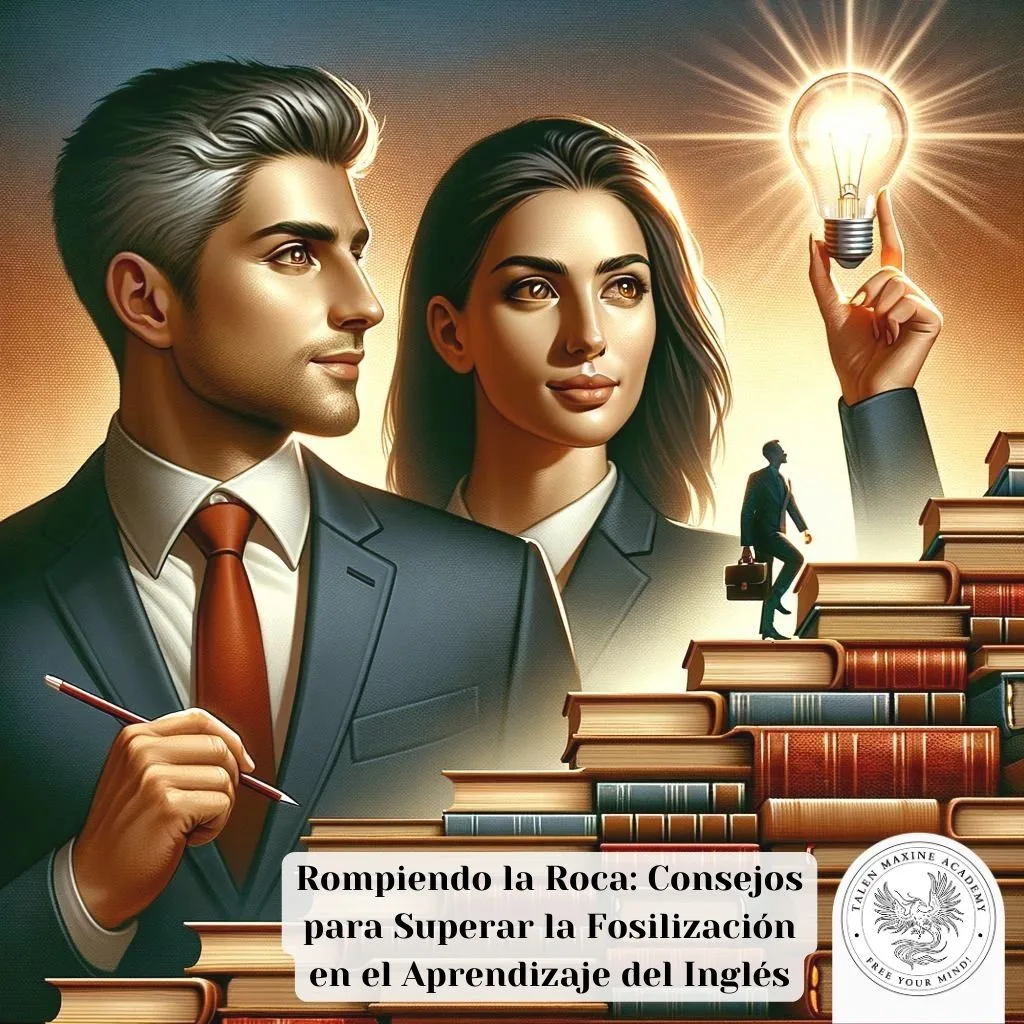🇪🇸 Rompiendo la Roca: Consejos para Superar la Fosilización en el Aprendizaje del Inglés
Hoy vamos a abordar un tema que tal vez te resulte familiar: la «fosilización» en el aprendizaje de idiomas. Además, te daré consejos prácticos para superar este obstáculo y hacer que tu inglés mejore muchísimo.
¿Qué es la Fosilización?
La fosilización no es más que esos pequeños errores que, sin darnos cuenta, se convierten en habituales cuando hablamos o escribimos en inglés. Aunque nos corrijan y aunque veamos la forma correcta mil veces, parece que esos errores decidieron instalarse cómodamente en nuestro idioma. Pueden ser de gramática, pronunciación o vocabulario, y se arraigan por diversas razones:
- La influencia del idioma materno: A veces, nuestro propio idioma se entromete, haciendo que ciertas estructuras o palabras se nos «peguen» incorrectamente en inglés.
- Errores prolongados: Si no corregimos un error al principio, este puede convertirse en un hábito difícil de romper.
- Falta de conciencia o feedback: Si no somos conscientes de nuestros errores o no recibimos correcciones, es difícil mejorar.
- Motivación y actitud: La falta de ganas de mejorar o una actitud de conformismo también pueden hacer que nuestros errores se fosilicen.
Aquí te presento algunos ejemplos comunes de fosilización:
Uso incorrecto de los tiempos verbales:
- Incorrecto: «I go to the movies yesterday.»
- Correcto: «I went to the movies yesterday.»
Razón de la fosilización: Tendencia a usar el presente simple en lugar del pasado simple.
Omisiones de ‘do’ en preguntas y negaciones:
- Incorrecto: «You know her?»
- Correcto: «Do you know her?»
Razón de la fosilización: En español, el uso de ‘do’ no es necesario para formar preguntas.
Falsos amigos o cognados:
- Incorrecto: «I have 25 years.»
- Correcto: «I am 25 years old.»
Razón de la fosilización: Tendencia a traducir directamente del español al inglés.
Consejos Prácticos para Superar la Fosilización
- Incrementa la exposición al Idioma: Sumérgete en el idioma inglés tanto como sea posible. Escucha música, mira películas o series en inglés, lee libros o artículos, y esfuérzate por pensar en inglés durante tu día a día. Esto te ayudará a acostumbrarte a las estructuras y sonidos naturales del idioma.
- Práctica consciente y repetición: Identifica tus errores más comunes (los que se han fosilizado) y practica específicamente esas áreas. Puedes escribir oraciones correctamente, repetirlas en voz alta, o incluso grabarte hablando para luego escuchar y analizar tu pronunciación y uso del idioma.
- Busca retroalimentación y úsala a tu favor: Interactúa con hablantes nativos o profesores calificados que puedan corregirte. No te limites a recibir la corrección, sino comprende el motivo del error y practica la forma correcta varias veces.
- Crea un diario de aprendizaje: Lleva un registro de tus errores comunes y las correcciones correspondientes. Revisa este diario regularmente para recordar lo que necesitas practicar y celebra también los errores que has superado.
- Cambia tu mentalidad: En lugar de ver la fosilización como un obstáculo insuperable, considera cada error como una oportunidad para aprender algo nuevo. Sé paciente y persistente. Aprender un idioma es un proceso, y cada pequeño paso te acerca a tu objetivo.
- Practica la pronunciación y la entonación: Utiliza herramientas como aplicaciones de aprendizaje de idiomas, grabaciones de hablantes nativos o clases de pronunciación para mejorar tu acento. Presta especial atención a los sonidos que no existen en español.
La clave para superar la fosilización es la constancia, la práctica consciente, y una actitud positiva hacia el aprendizaje. ¡Disfruta aprendiendo de tus errores! Son señales de que estás progresando y cada corrección te acerca un paso más a la fluidez en inglés.
🇺🇸 Breaking the Rock: Tips for Overcoming Fossilization in English Learning
Today, we will tackle a topic that may be familiar to you: «fossilization» in language learning. Additionally, I will give you practical advice to overcome this obstacle and significantly improve your English.
What is Fossilization?
Fossilization refers to those small errors that, without us realizing it, become habitual when we speak or write in English. Even if we are corrected and even if we see the correct form a thousand times, it seems that these errors have decided to comfortably settle into our language. They can be grammatical, pronunciation, or vocabulary errors, and they take root for various reasons:
- The influence of the mother tongue: Sometimes, our own language interferes, making certain structures or words «stick» incorrectly in English.
- Prolonged errors: If we do not correct an error from the beginning, it can become a difficult habit to break.
- Lack of awareness or feedback: If we are not aware of our errors or do not receive corrections, it is difficult to improve.
- Motivation and attitude: A lack of desire to improve or an attitude of complacency can also cause our errors to fossilize.
Here are some common examples of fossilization:
Incorrect use of verb tenses:
- Incorrect: «I go to the movies yesterday.»
- Correct: «I went to the movies yesterday.»
Reason for fossilization: Tendency to use the simple present instead of the simple past.
Omissions of ‘do’ in questions and negations:
- Incorrect: «You know her?»
- Correct: «Do you know her?»
Reason for fossilization: In Spanish, the use of ‘do’ is not necessary to form questions.
False friends or cognates:
- Incorrect: «I have 25 years.»
- Correct: «I am 25 years old.»
Reason for fossilization: Tendency to translate directly from Spanish to English.
Practical Tips for Overcoming Fossilization
- Increase language exposure: Immerse yourself in the English language as much as possible. Listen to music, watch movies or series in English, read books or articles, and make an effort to think in English during your day-to-day. This will help you get used to the natural structures and sounds of the language.
- Conscious practice and repetition: Identify your most common errors (those that have fossilized) and practice specifically in those areas. You can write sentences correctly, repeat them out loud, or even record yourself speaking to later listen and analyze your pronunciation and use of the language.
- Seek feedback and use it to your advantage: Interact with native speakers or qualified teachers who can correct you. Do not just receive the correction, but understand the reason for the error and practice the correct form several times.
- Create a learning journal: Keep a record of your common errors and the corresponding corrections. Review this journal regularly to remember what you need to practice and also celebrate the errors you have overcome.
- Change your mindset: Instead of viewing fossilization as an insurmountable obstacle, consider each error as an opportunity to learn something new. Be patient and persistent. Learning a language is a process, and every small step brings you closer to your goal.
- Practice pronunciation and intonation: Use tools like language learning apps, recordings of native speakers, or pronunciation classes to improve your accent. Pay special attention to sounds that do not exist in Spanish.
The key to overcoming fossilization is consistency, conscious practice, and a positive attitude toward learning. Enjoy learning from your mistakes! They are signs that you are progressing, and every correction brings you one step closer to fluency in English.

Talen Maxine
Asesor Experto en el Aprendizaje de Idiomas
Expert Advisor in Language Learning

